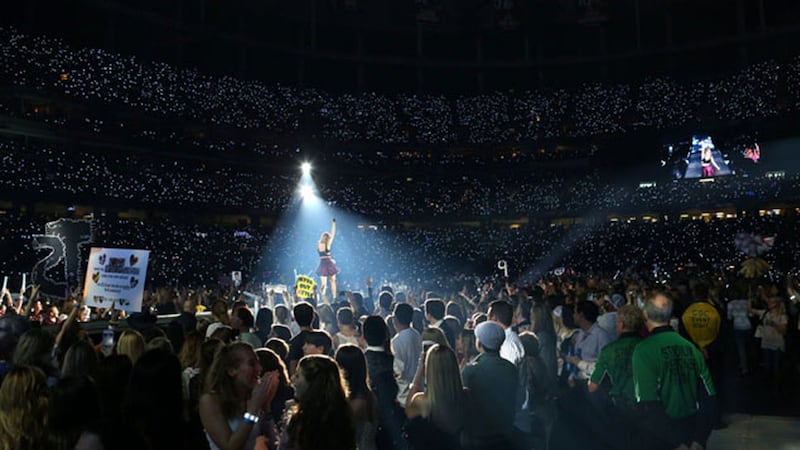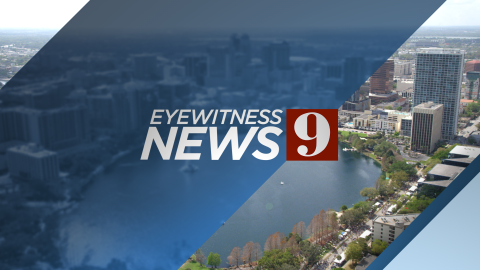ORLANDO, Fla. — On Tuesday, much of the United States stared endlessly at computer or phone screens, watching a sliding bar go positively nowhere.
>>> STREAM CHANNEL 9 EYEWITNESS NEWS LIVE <<<
Very few things can hold the attention of today’s generations for as long as the promise of Taylor Swift concert tickets. Tuesday’s offering wasn’t even the official sale, but a presale, exclusively held in advance for “verified fans.”
Swift certainly had a lot of them.
READ: Ticketmaster canceling next Taylor Swift concert ticket sale
By the end of the following day, 2.4 million tickets had been sold across the United States, Swift reported. A seemingly equal number of people took to social media to voice their complaints at Ticketmaster, the exclusive vendor of the tickets — including many who managed to score seats of their own.
“Ticketmaster is like, ‘We’ve hidden five Taylor Swift tickets in chocolate bars located across the world GOOD LUCK’” one user wrote.
The surge of angry Swifties began voicing a familiar call: a demand to break up Ticketmaster’s parent company, Live Nation, which has dominated the music industry since 2010.
Economists say it should never have been allowed to grow this big to begin with — and the U.S. Department of Justice is once again looking into whether its grip on the market is too much.
READ: Taylor Swift says Ticketmaster fiasco ‘excruciating for me’
The musical monopoly
As the go-to place for live entertainment, Ticketmaster’s name has been associated with controversy for decades. In the early 1990s, the company’s practices were reviewed by the Department of Justice amid protests from artists like Pearl Jam.
Back then, Pearl Jam wanted to throw a free Labor Day “thank you” concert to 30,000 hometown Seattle fans, the Los Angeles Times reported.
“The quintet was angered when the ticket firm requested a $1 service fee for each free pass it distributed,” a 1994 article said. “The band went around the firm and gave away tickets on its own.”
READ: Taylor Swift announces ‘Eras’ 27-date US 2023 stadium tour
The investigation kicked off after a later scuffle between the band and the company, and resulted in hearings on Capitol Hill. However, the Justice Department closed its investigation without explanation in 1995. According to The New York Times, Ticketmaster sold two-thirds of the 10 million seats in large arenas that year.
The company tightened its grip through the digital age and in 2010 was approved to merge with Live Nation — which ran concert venues and managed artists — over the objections of antitrust watchdogs. The government placed guardrails in place to ensure the new conglomerate didn’t abuse its power through 2020, though they were later extended to 2025 after regulators found some of those guidelines had been violated.
“Live Nation-Ticketmaster has a monopoly in all of the classic ways,” Robyn Shapiro, communications director at the antitrust think tank American Economic Liberties Project, said. “That merger gave the resulting entity an incredible amount of control, not just over the primary ticketing market, which now controls to the tune of about 70%, but also to control over venues and control over artists.”
READ: Taylor Swift releases new album ‘Midnights’
Ticketmaster’s reach into Central Florida is extensive. It sells tickets to clubs in downtown Orlando and Sanford, community theaters in Ocala, Daytona and Melbourne, and festivals and events across the region.
However, it’s primarily known as the exclusive seller of tickets for the area’s biggest venues: Camping World Stadium, the Amway Center and the Silver Spurs Arena in Osceola County.
“We couldn’t say, well, I’m just not going to buy from them. You literally have to,” self-described Swiftie Alicia Reese explained.
READ: Shake it off? Parents come up short for Taylor Swift tickets
In turn, Live Nation outright owns or has a stake in seven venues across the Sunshine State, including amphitheaters in Tampa, Miami and West Palm and the House of Blues in Orlando. Live Nation’s website also lists Orlando’s Ace Café under its portfolio, though an employee of the venue disputed that Friday afternoon and the business’ marketing team did not respond to an email requesting clarification.
In Central Florida and beyond, economists said Ticketmaster’s practice of charging high fees for its services continues to be the easiest target for a Department of Justice investigation.
“You’re paying like one and a half times the face value of the ticket just in fees,” the University of South Florida’s Dr. Michael Snipes said. “The reason why they can do that is because, well, there’s no other choice. If you wanted to go see Taylor Swift you have to go through Ticketmaster. You have to pay those fees.”
READ: Taylor Swift’s ‘Eras Tour’ ticket sales crashed Ticketmaster, sparks frustration for fans
Justice Department officials said their investigation began six weeks before the Swift-related saga occurred. That places it shortly after questions were raised about astronomical prices for Bruce Springsteen’s tour.
“We have [sent] 40,000 emails to the DOJ,” Shapiro said. “I don’t know the last time that many people asked the Department of Justice to unwind a merger, but there’s overwhelming public demand and clearly interest in listening to them.”
As it announced the planned public sale of tickets was canceled, Ticketmaster blamed Swift’s star power for its shortcomings.
“Based on the volume of traffic to our site, Taylor would need to perform over 900 stadium shows,” a spokesperson wrote. “That’s a stadium show every single night for the next 2.5 years. While it’s impossible for everyone to get tickets to these shows, we know we can do more to improve the experience and that’s what we’re focused on.”
On Instagram, the artist herself said she was upset and was assured multiple times the platform would be able to handle the volume. She stated there were no excuses for what happened.
READ: Celebrate the holiday season with Universal Orlando’s new treats and activities
One tree in a forest
While some economists argue that breaking Live Nation and Ticketmaster back into two companies would be a good starting point, many view it as insufficient if officials have the goal of introducing competition into the live event industry.
“Breaking it half isn’t really going to do much because while there are two related industries, they’re still ultimately doing different things,” Snipes said. “There’s no overlap between venues and tickets.”
Some said the government could introduce a regulated monopoly system into the mix that doesn’t automatically create other companies but gives potential competition room to grow or at least keep the one company in check.
Suggestions also included restricting Ticketmaster to live concerts only, giving a new entity an opportunity to take over sporting events or other forms of entertainment.
READ: Taylor Swift angry for fans in Ticketmaster meltdown
However, several of them steered the conversation past live events entirely, saying Live Nation’s domination was part of a wider corporatization of the American economy that has put a strain on supply chains and consumers at nearly every turn.
“Corporate monopolies are pervasive in our economy,” Shapiro said. “They’re the reason why parents couldn’t find baby formula months ago. They’re the reason why insulin is so expensive.”
Others listed monopolies in the tech industry, soda and meat markets as problematic.
Economists often cite the issues monopolies create — or hide — by looking toward the past. Telephone and wireless technology took off after regulators broke up AT&T, leading to a boom and the internet age. When Standard Oil was broken up into dozens of companies, gasoline production became four times more efficient, mineral historians note.
READ: 9 things to do in Central Florida this weekend
With that post-monopoly track record of innovation, the question becomes: Why is the American government so willing to allow them to survive?
Sometimes, economists said, it’s beneficial to be big.
“The government does not want to interfere with business in general,” University of Central Florida economist Dr. Axel Stock said. “If you think about innovations, they are very costly. So if there is a bigger company, they have more resources to actually provide. At some point, if they become too big, the government has to stop it instantly.”
Click here to download the free WFTV news and weather apps, click here to download the WFTV Now app for your smart TV and click here to stream Channel 9 Eyewitness News live.
©2022 Cox Media Group








